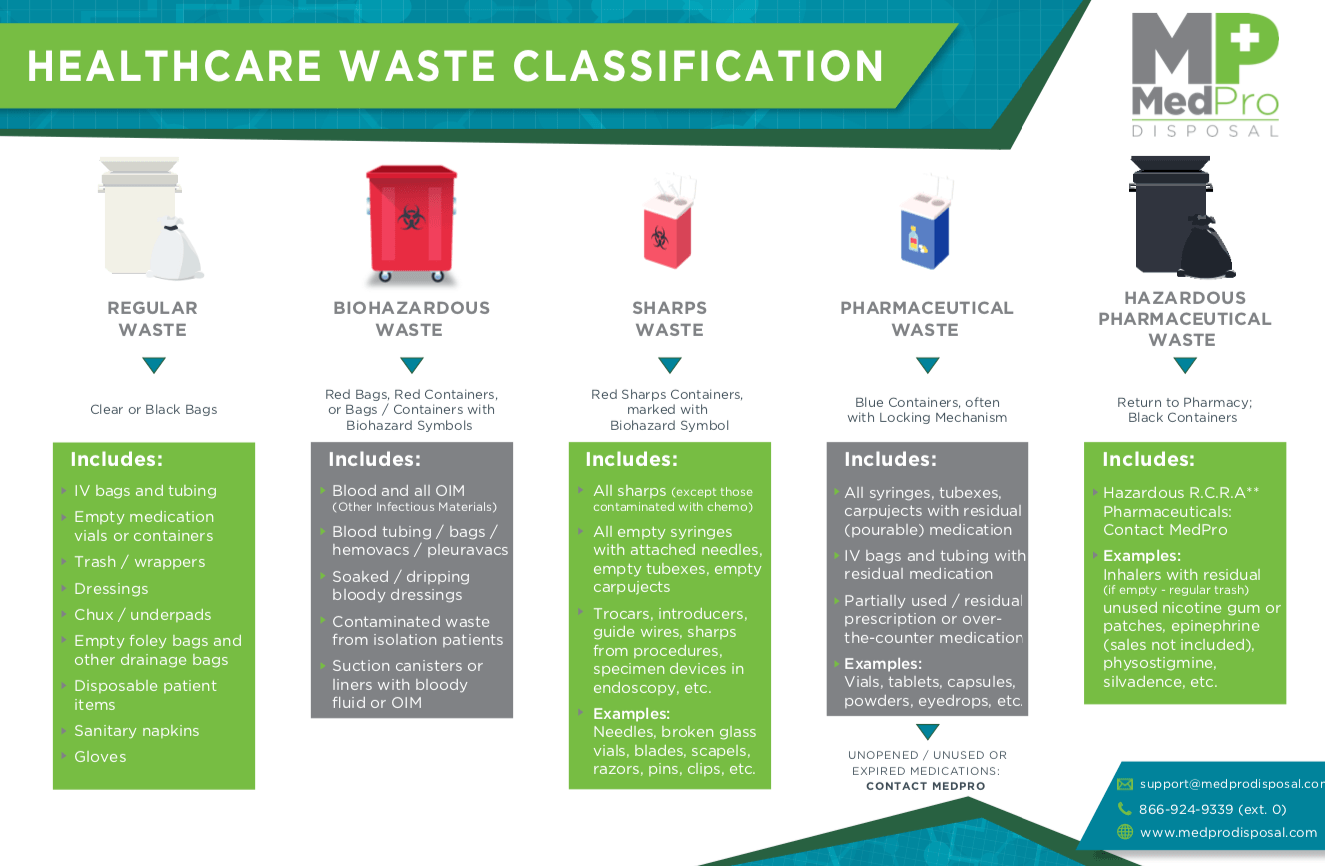Benefit at Your Front Door: Finding Reliable Medical Waste Removal Near Me
Benefit at Your Front Door: Finding Reliable Medical Waste Removal Near Me
Blog Article
The Importance of Proper Garbage Disposal Practices
The management of waste is a vital facet of environmental stewardship that usually goes undetected in our day-to-days live. Proper waste disposal practices are not just a matter of benefit however are necessary for safeguarding our communities and public health. From the consequences of inappropriate waste disposal on our atmosphere to the long-term ramifications for future generations, the significance of adopting sustainable waste monitoring practices can not be overstated. By checking out the ecological impact of untrustworthy garbage disposal, the benefits of reusing campaigns, and the value of community involvement in waste reduction initiatives, a much deeper understanding of why correct garbage disposal practices are critical emerges.
Ecological Effect of Improper Disposal
Inappropriate disposal of waste positions a considerable threat to the environment because of its damaging impacts on ecosystems and human health. When waste is not effectively taken care of, it can lead to air pollution of the soil, air, and water, creating injury to numerous plant and animal species. click here. Chemicals and toxins from incorrectly disposed waste can seep right into the ground, infecting groundwater sources and impacting the health and wellness of both wildlife and human beings
Moreover, the build-up of waste in garbage dumps generates greenhouse gases like methane, adding to climate change and global warming. Inappropriate disposal techniques also lead to littering, which not just deteriorates the visual value of the atmosphere but can likewise harm wildlife through consumption or complexity.
To mitigate these ecological effects, it is vital for neighborhoods and individuals to embrace correct garbage disposal techniques such as recycling, composting, and responsible harmful waste disposal. By taking these steps, we can assist secure communities, maintain natural sources, and protect human health for current and future generations.
Advantages of Recycling Programs
Frequently taking part in recycling programs uses various benefits for both the environment and culture overall. One of the vital benefits of recycling is the conservation of all-natural resources. By recycling materials such as paper, metal, glass, and plastic, less resources need to be drawn out from the planet, bring about lowered logging, mining, and drilling tasks. This conservation of sources not only aids in keeping eco-friendly balance yet additionally adds to lasting growth.
Moreover, reusing plays an important role in lowering energy consumption and greenhouse gas exhausts. The manufacturing of products from recycled materials normally calls for much less energy contrasted to producing from virgin resources - medical waste removal. Consequently, the carbon footprint connected with the manufacturing process is considerably decreased, assisting in the battle against climate adjustment
In addition, reusing programs develop job possibilities in the reusing market, promoting economic growth and social well-being. By encouraging the recycling and reuse of products, these programs sustain a round economic climate that lessens waste generation and makes best use of resource performance, eventually leading to a cleaner, greener future for generations to find.
Hazardous Waste Administration Standards
Executing efficient dangerous waste administration guidelines is essential for minimizing ecological and health and wellness risks connected with the improper disposal of dangerous materials - click here. Appropriate handling, treatment, and disposal of contaminated materials are necessary to protect against contamination of dirt, water resources, and air
One key standard is correct labeling of unsafe waste containers to make sure safe handling and transport. Additionally, facilities have to stick to strict storage space needs to protect against leaks, spills, or accidents that can threaten human health and the atmosphere. Routine training programs for staff members on contaminated materials management practices are also important to ensure conformity with regulations and promote a society of security.
Additionally, hazardous waste needs to be segregated based on its buildings to protect against chain reactions that can bring about harmful Continue scenarios. Applying a thorough waste radar can help check the motion of dangerous materials from generation to disposal, making sure openness and liability. By adhering to these guidelines faithfully, businesses and industries can add to a much safer and cleaner environment for future and existing generations.
Area Involvement in Waste Reduction
To efficiently attend to the environmental and health dangers connected with harmful waste monitoring, involving the area in waste reduction efforts is critical. Neighborhood participation plays an essential duty in promoting sustainable waste management techniques and cultivating a culture of environmental duty. By educating citizens about proper waste partition, reusing, and composting strategies, communities can considerably lower the quantity of waste sent out to landfills, therefore lessening environmental air pollution and preserving natural deposits.
Area engagement in waste decrease programs likewise aids in increasing recognition regarding the significance of waste minimization and motivates individuals to take on environmentally friendly practices in their every day lives - medical waste disposal. Collaborative initiatives in between neighborhood authorities, waste management business, and community participants can result in the execution of effective waste decrease approaches tailored to the particular requirements of each area or town
Additionally, area involvement cultivates a sense of ownership and responsibility amongst citizens, equipping them to take aggressive steps in the direction of minimizing waste generation and promoting a cleaner, healthier atmosphere for existing and future generations. By interacting towards common waste reduction goals, areas can make a substantial impact on minimizing the damaging impacts of improper garbage disposal techniques.

Future of Sustainable Waste Practices
Standard waste disposal techniques, such as landfilling and incineration, are no longer lasting in the long term due to their substantial ecological effects. Relocating ahead, the future of sustainable waste practices exists in embracing a round economic situation approach, where sources are reused, reused, or repurposed to minimize waste generation.
Technical developments play an essential role fit the future of lasting waste practices. Advanced waste sorting and reusing technologies can help enhance the effectiveness of waste management procedures, enabling the recuperation of useful sources from waste streams. Furthermore, the adoption of biodegradable materials and composting approaches can assist reduce the quantity of organic waste winding up in garbage dumps, thus mitigating greenhouse gas discharges.
In addition, promoting consumer awareness and education and learning on correct waste partition and disposal methods is necessary for driving behavior modification towards sustainability. By fostering a culture of waste reuse, reduction, and recycling, areas can collectively add to a cleaner and healthier setting for future generations.

Conclusion
Finally, correct garbage disposal techniques are crucial for decreasing environmental impact and promoting sustainability. By applying reusing programs, managing dangerous waste appropriately, and encouraging community involvement in waste decrease initiatives, we can function in the direction of a cleaner and healthier environment. It is important for individuals, governments, and businesses to prioritize sustainable waste methods for the future health of our earth.

From the effects of improper waste disposal on our atmosphere to the long-term ramifications for future generations, the value of taking on sustainable waste management techniques can not be overstated. By discovering the environmental effect of careless waste disposal, the advantages of recycling initiatives, and the importance of neighborhood engagement in waste decrease initiatives, a deeper understanding of why correct waste disposal techniques are critical arises.
By educating citizens about correct waste segregation, recycling, and composting techniques, communities can dramatically reduce the amount of waste sent to land fills, consequently reducing environmental air pollution and preserving all-natural resources. (click here)
Moving forward, the future of sustainable waste methods lies in accepting a circular economy method, where sources are reused, reused, or repurposed to reduce waste generation.
Advanced waste sorting and recycling modern technologies can aid enhance the efficiency of waste management processes, enabling for the healing of beneficial sources from waste streams.
Report this page